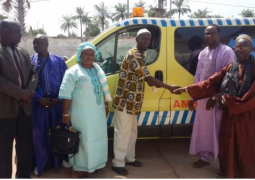
As
the year ends, it is time to reflect on how State Enterprises function and the
general expectations of The Gambian populace about their profitability and
socio-economic derivate benefits to social protection of vulnerable groups in
The Gambia.
Around
The Gambia, State Enterprises made headlines, sparked consumer concern and
revitalise tax payers’ support for capital to pay for this or that in what
should be a wake-up call for Gambia government to critically examine and follow
through on their commitments and make good on old recommendations, promises as
well as new, meaningful resolutions to redirect the affairs of money losing
State Enterprises.
Truth
must be told that state enterprises need some inspiration, to critically
examine the courses of their unfortunate balance sheet, unpredictable and poor
performance record from 1965 to date.
State
enterprises have a way of presenting excellent narrative year-in-year-out of
their activities but not a convincing financial accounting. Often, they
highlight offering smart services to the Gambia populace while the National
Assembly Select Committee listens in anticipation of understanding the
operations of all state enterprises that are funded with hard earned tax
payers’ money.
In
a regrettable manner, state enterprises profitability and performance
indicators are negative. Many a time, tax payers are urgently asked to bail
them out, either by contracting external or internal creditline from the
financial market to salvage their operations.
What
is unfortunate is that the persistent mentorship from the National Assembly
Select committee overseeing operations of the money-losing state-run
enterprises is not respected and so not yielding positive out-comes.
Evidently,
after fifty-four years of self-rule and direct sovereign investment into public
enterprises, little or no reasonable dividend is paid to treasury as reward for
providing the necessary capital every single year since 1965.
Few
exceptions of profitable state enterprises can be listed, but numerous are that
they continually failed to make financial gains not to mention contributions in
the form of annual dividend to beef-up-state-revenue-collection and improve
national well-being. So why are monies not paid to national treasury? Could it
be as a result of corrupt practices, system failure or unnecessary political
interference?
This
is a rather disturbing picture to see hundred percent Gambian owned state
enterprises not making profit while the private sectors strive without fail to
pay attractive dividend to private investors annually and even pay up all taxes
owed to government.
The
Gambia populace is disappointed that year-in-year-out, their state-run
enterprises are almost always in the red and had to be continually bailed out
by the tax payers. This must stop.
The
year 2019 has come and gone with its challenges and opportunities. The Gambia
government has proposed several anti-corruption legislations and a draft
constitution that is expected to compel public and private sector actors to
uphold the highest standard of ethics in delivery of public services.
The
government should strive enforcement all of the listed stricter sanction that
the new laws will bring against violators of compliance regulations, establish
the “National Anti-Corruption Commission” and reform the local government
system in The Gambia.
Looking
to the New Year with hope, the government of The Gambia should see plenty of
room for state enterprises progress to accelerate and some negative trends to
reverse.
The
Gambia governments’ new year resolution should usher in impartial fact-finding
commission that should be tasked to examine the root causes of continuous
failure of state enterprises such as NAWEC, probe why after fifty-four years
and billions of dalasis investment, the system is still not working.
The
Point Newspaper wishes you a great start into the New Year and renewed energy
for your own resolutions.




